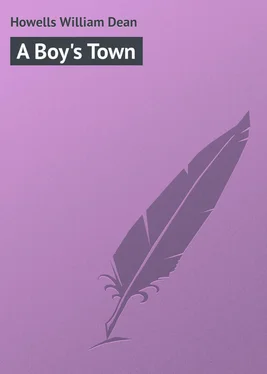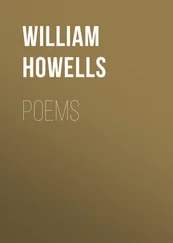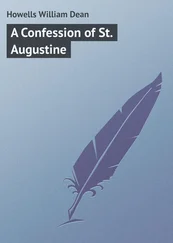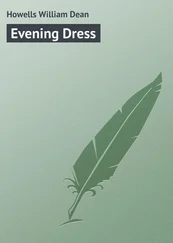William Howells - A Boy's Town
Здесь есть возможность читать онлайн «William Howells - A Boy's Town» — ознакомительный отрывок электронной книги совершенно бесплатно, а после прочтения отрывка купить полную версию. В некоторых случаях можно слушать аудио, скачать через торрент в формате fb2 и присутствует краткое содержание. Издательство: Иностранный паблик, Жанр: foreign_prose, foreign_children, на английском языке. Описание произведения, (предисловие) а так же отзывы посетителей доступны на портале библиотеки ЛибКат.
- Название:A Boy's Town
- Автор:
- Издательство:Иностранный паблик
- Жанр:
- Год:неизвестен
- ISBN:нет данных
- Рейтинг книги:5 / 5. Голосов: 1
-
Избранное:Добавить в избранное
- Отзывы:
-
Ваша оценка:
- 100
- 1
- 2
- 3
- 4
- 5
A Boy's Town: краткое содержание, описание и аннотация
Предлагаем к чтению аннотацию, описание, краткое содержание или предисловие (зависит от того, что написал сам автор книги «A Boy's Town»). Если вы не нашли необходимую информацию о книге — напишите в комментариях, мы постараемся отыскать её.
A Boy's Town — читать онлайн ознакомительный отрывок
Ниже представлен текст книги, разбитый по страницам. Система сохранения места последней прочитанной страницы, позволяет с удобством читать онлайн бесплатно книгу «A Boy's Town», без необходимости каждый раз заново искать на чём Вы остановились. Поставьте закладку, и сможете в любой момент перейти на страницу, на которой закончили чтение.
Интервал:
Закладка:
I am glad to know that in the days when he was thoughtless and senseless enough, my boy never was guilty of any degree of this meanness. It was his brother, I suppose, who taught him to abhor it; and perhaps it was his own suffering from it in part; for he, too, sometimes shed bitter tears over such a knot, as I have seen hapless little wretches do, tearing at it with their nails and gnawing at it with their teeth, knowing that the time was passing when they could hope to hide the fact that they had been in swimming, and foreseeing no remedy but to cut off the sleeve above the knot, or else put on their clothes without the shirt, and trust to untying the knot when it got dry.
There must have been a lurking anxiety in all the boys' hearts when they went in without leave, or, as my boy was apt to do, when explicitly forbidden. He was not apt at lying, I dare say, and so he took the course of open disobedience. He could not see the danger that filled the home hearts with fear for him, and he must have often broken the law and been forgiven, before Justice one day appeared for him on the river-bank and called him away from his stolen joys. It was an awful moment, and it covered him with shame before his mates, who heartlessly rejoiced, as children do, in the doom which they are escaping. That sin, at least, he fully expiated; and I will whisper to the Young People here at the end of the chapter, that somehow, soon or late, our sins do overtake us, and insist upon being paid for. That is not the best reason for not sinning, but it is well to know it, and to believe it in our acts as well as our thoughts. You will find people to tell you that things only happen so and so. It may be; only, I know that no good thing ever happened to happen to me when I had done wrong.
IV.
THE CANAL AND ITS BASIN
The canal came from Lake Erie, two hundred miles to the northward, and joined the Ohio River twenty miles south of the Boy's Town. For a time my boy's father was collector of tolls on it, but even when he was old enough to understand that his father held this State office (the canal belonged to the State) because he had been such a good Whig, and published the Whig newspaper, he could not grasp the notion of the distance which the canal-boats came out of and went into. He saw them come and he saw them go; he did not ask whence or whither; his wonder, if he had any about them, did not go beyond the second lock. It was hard enough to get it to the head of the Basin, which left the canal half a mile or so to the eastward, and stretched down into the town, a sheet of smooth water, fifteen or twenty feet deep, and a hundred wide; his sense ached with, the effort of conceiving of the other side of it. The Basin was bordered on either side near the end by pork-houses, where the pork was cut up and packed, and then lay in long rows of barrels on the banks, with other long rows of salt-barrels, and yet other long rows of whiskey-barrels; cooper-shops, where the barrels were made, alternated with the pork-houses. The boats brought the salt and carried away the pork and whiskey; but the boy's practical knowledge of them was that they lay there for the boys to dive off of when they went in swimming, and to fish under. The water made a soft tuck-tucking at the sterns of the boat, and you could catch sunfish, if you were the right kind of a boy, or the wrong kind; the luck seemed to go a good deal with boys who were not good for much else. Some of the boats were open their whole length, with a little cabin at the stern, and these pretended to be for carrying wood and stone, but really again were for the use of the boys after a hard rain, when they held a good deal of water, and you could pole yourself up and down on the loose planks in them. The boys formed the notion at times that some of these boats were abandoned by their owners, and they were apt to be surprised by their sudden return. A feeling of transgression was mixed up with the joys of this kind of navigation; perhaps some of the boys were forbidden it. No limit was placed on their swimming in the Basin, except that of the law which prohibited it in the daytime, as the Basin was quite in the heart of the town. In the warm summer nights of that southerly latitude, the water swarmed with laughing, shouting, screaming boys, who plunged from the banks and rioted in the delicious water, diving and ducking, flying and following, safe in the art of swimming which all of them knew. They turned somersaults from the decks of the canal-boats; some of the boys could turn double somersaults, and one boy got so far as to turn a somersault and a half; it was long before the time of electric lighting, but when he struck the water there came a flash that seemed to illumine the universe.
I am afraid that the Young People will think I am telling them too much about swimming. But in the Boy's Town the boys really led a kind of amphibious life, and as long as the long summer lasted they were almost as much in the water as on the land. The Basin, however, unlike the river, had a winter as well as a summer climate, and one of the very first things that my boy could remember was being on the ice there, when a young man caught him up into his arms, and skated off with him almost as far away as the canal. He remembered the fearful joy of the adventure, and the pride, too; for he had somehow the notion that this young fellow was handsome and fine, and did him an honor by his notice – so soon does some dim notion of worldly splendor turn us into snobs! The next thing was his own attempt at skating, when he was set down from the bank by his brother, full of a vainglorious confidence in his powers, and appeared instantly to strike on the top of his head. Afterwards he learned to skate, but he did not know when, any more than he knew just the moment of learning to read or to swim. He became passionately fond of skating, and kept at it all day long when there was ice for it, which was not often in those soft winters. They made a very little ice go a long way in the Boy's Town; and began to use it for skating as soon as there was a glazing of it on the Basin. None of them ever got drowned there; though a boy would often start from one bank and go flying to the other, trusting his speed to save him, while the thin sheet sank and swayed, but never actually broke under him. Usually the ice was not thick enough to have a fire built on it; and it must have been on ice which was just strong enough to bear that my boy skated all one bitter afternoon at Old River, without a fire to warm by. At first his feet were very cold, and then they gradually felt less cold, and at last he did not feel them at all. He thought this very nice, and he told one of the big boys. "Why, your feet are frozen!" said the big boy, and he dragged off my boy's skates, and the little one ran all the long mile home, crazed with terror, and not knowing what moment his feet might drop off there in the road. His mother plunged them in a bowl of ice-cold water, and then rubbed them with flannel, and so thawed them out; but that could not save him from the pain of their coming to: it was intense, and there must have been a time afterwards when he did not use his feet.
His skates themselves were of a sort that I am afraid boys would smile at nowadays. When you went to get a pair of skates forty or fifty years ago, you did not make your choice between a Barney & Berry and an Acme, which fastened on with the turn of a screw or the twist of a clamp. You found an assortment of big and little sizes of solid wood bodies with guttered blades turning up in front with a sharp point, or perhaps curling over above the toe. In this case they sometimes ended in an acorn; if this acorn was of brass, it transfigured the boy who wore that skate; he might have been otherwise all rags and patches, but the brass acorn made him splendid from head to foot. When you had bought your skates, you took them to a carpenter, and stood awe-strickenly about while he pierced the wood with strap-holes; or else you managed to bore them through with a hot iron yourself. Then you took them to a saddler, and got him to make straps for them; that is, if you were rich, and your father let you have a quarter to pay for the job. If not, you put strings through, and tied your skates on. They were always coming off, or getting crosswise of your foot, or feeble-mindedly slumping down on one side of the wood; but it did not matter, if you had a fire on the ice, fed with old barrels and boards and cooper's shavings, and could sit round it with your skates on, and talk and tell stories, between your flights and races afar; and come whizzing back to it from the frozen distance, and glide, with one foot lifted, almost among the embers.
Читать дальшеИнтервал:
Закладка:
Похожие книги на «A Boy's Town»
Представляем Вашему вниманию похожие книги на «A Boy's Town» списком для выбора. Мы отобрали схожую по названию и смыслу литературу в надежде предоставить читателям больше вариантов отыскать новые, интересные, ещё непрочитанные произведения.
Обсуждение, отзывы о книге «A Boy's Town» и просто собственные мнения читателей. Оставьте ваши комментарии, напишите, что Вы думаете о произведении, его смысле или главных героях. Укажите что конкретно понравилось, а что нет, и почему Вы так считаете.












